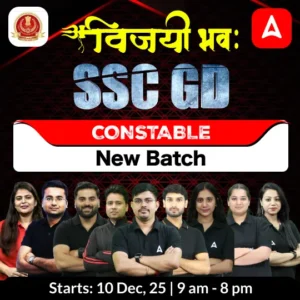This year, there are a total of 11558 non-technical popular vacancies in the RRB NTPC exam. The exam date for the Railway NTPC Exam is expected in February- march 2025. The Railway NTPS exam is considered to be a good career choice where millions of candidates compete for a limited number of vacancies. Preparing for the Railway NTPC Exam can be a challenging task for students, but with the correct strategies, they can navigate this journey successfully. Preparing for the Railway NTPC Exam requires a solid understanding of the syllabus, exam pattern, and many other factors. This guide offers 6 essential exam tips and steps to organize a candidate’s preparation and boost their confidence for exam day.
1. Understand the Exam Pattern
Understanding the exam pattern is one of the most crucial aspects of preparing for any competitive examination like the Railway NTPC exam. Candidates must first understand the exam pattern for whichever exam they are appearing for. The exam typically includes different sections, discussed in the below table:
| Subject | Number of Questions | Maximum Marks | Duration |
|---|---|---|---|
| Arithmetic | 30 | 30 | 90 Minutes |
| General Intelligence & Reasoning | 30 | 30 | |
| General Awareness | 40 | 40 | |
| Total | 100 | 100 |
For more details, visit adda247
Candidates must familiarise themselves with the structure and types of questions that are usually asked in the exam, aspirants can help themselves by reducing their anxiety and will feel more prepared on the day of the exam.
2. Practice Previous Year Question Papers
Candidates can allocate time slots for each subject for effective preparation. They can practice the previous year’s question papers to prepare for the Railway NTPC exam. It gives candidates a clear idea of the types of questions that are frequently asked and helps them understand the format of the exam. When candidates prepare the previous year’s questions, they can very easily identify important questions and improve their time management skills. Additionally, when candidates review their answers, it allows them to see in what areas they need more practice. This method boosts their confidence and boosts their self-esteem to appear for the exam.
3. Time Management
Time management is another crucial aspect while preparing for such competitive exams. Candidates need to plan how to use each minute wisely. In the Railway NTPC exam, candidates should start by setting a specific time for each section of the question paper. Time can also be managed by allotting time to different sections based on their difficulty level. Candidates during practice sessions should use a timer to simulate exam conditions that will help them get used to working under pressure. By managing their time effectively, candidates can ensure that they complete all the questions and score well.
Here is a simple way to manage your time effectively:
| Section | Total Questions | Recommended Time (minutes) | Tips for Time Management |
|---|---|---|---|
| General Awareness | 40 | 25 | Skim through questions first and answer known ones quickly. |
| Mathematics | 30 | 30 | Prioritize easier problems and use shortcuts where possible. |
| General Intelligence | 30 | 25 | Quickly identify question types and don’t get stuck on one. |
| Total | 100 | 80 | Aim to finish early to review your answers. |
4. Speed and Accuracy
In the Railway NTPC exam, it is not just about answering questions quickly, candidates must also ensure that their answers are correct. To improve their speed and accuracy, aspirants can focus on reviewing their answers and learning from their mistakes. There should be a proper balance between speed and accuracy as it can make a huge difference in their overall marks. As candidates practice, they should also aim to increase their speed without sacrificing the quality of their answers so that they can confidently tackle their exams.
5. Attempt Mock Tests
Attempting mock tests for the Railway NTPC exam is another important aspect that needs to be kept during preparation. Attempting mock tests allows candidates to get familiar with the format and timings. This practice not only boosts their confidence but also helps them develop effective test-taking strategies. Mock tests are a valuable tool that can enhance a candidate’s performance on exam day.
6. Focus on Weak Areas
To tackle the issue of being stuck on weak areas, candidates can refer to the below table which can help them focus on their weak areas during the Railway NTPC Exam:
| Weak Area | Action Plan | Resources | Time Allocation (per week) | Progress Tracking |
|---|---|---|---|---|
| General Awareness | Review current events and important facts | Newspapers, online quizzes | 3 hours | Maintain a checklist of topics covered |
| Mathematics | Practice specific types of problems | Math workbooks, online courses | 4 hours | Track accuracy and time taken |
| General Intelligence | Solve logic puzzles and pattern questions | Apps, puzzle books | 2 hours | Record improvement over time |
| Subject-Specific Topics | Focus on high-weightage topics | Previous year papers, guides | 3 hours | Mark topics as mastered or pending |
| Total | 12 hours | Review weekly for progress |
Here, candidates can regularly update the table daily based on their subject preparation and progress.
Conclusion
In conclusion, it can be said that successful preparation for the RRB NTPC exam demands a strategic approach from the candidate. It includes understanding the exam pattern, practicing question papers from the previous year, and managing time efficiently. Candidates must focus on improving weak areas and attending regular mock tests. Commitment and organization are key factors in achieving these goals.



 RRB NTPC Previous Year Question Papers, ...
RRB NTPC Previous Year Question Papers, ...
 RRB NTPC vs RRB Group D, Difference Betw...
RRB NTPC vs RRB Group D, Difference Betw...
 Which Post is better in RRB NTPC?
Which Post is better in RRB NTPC?









